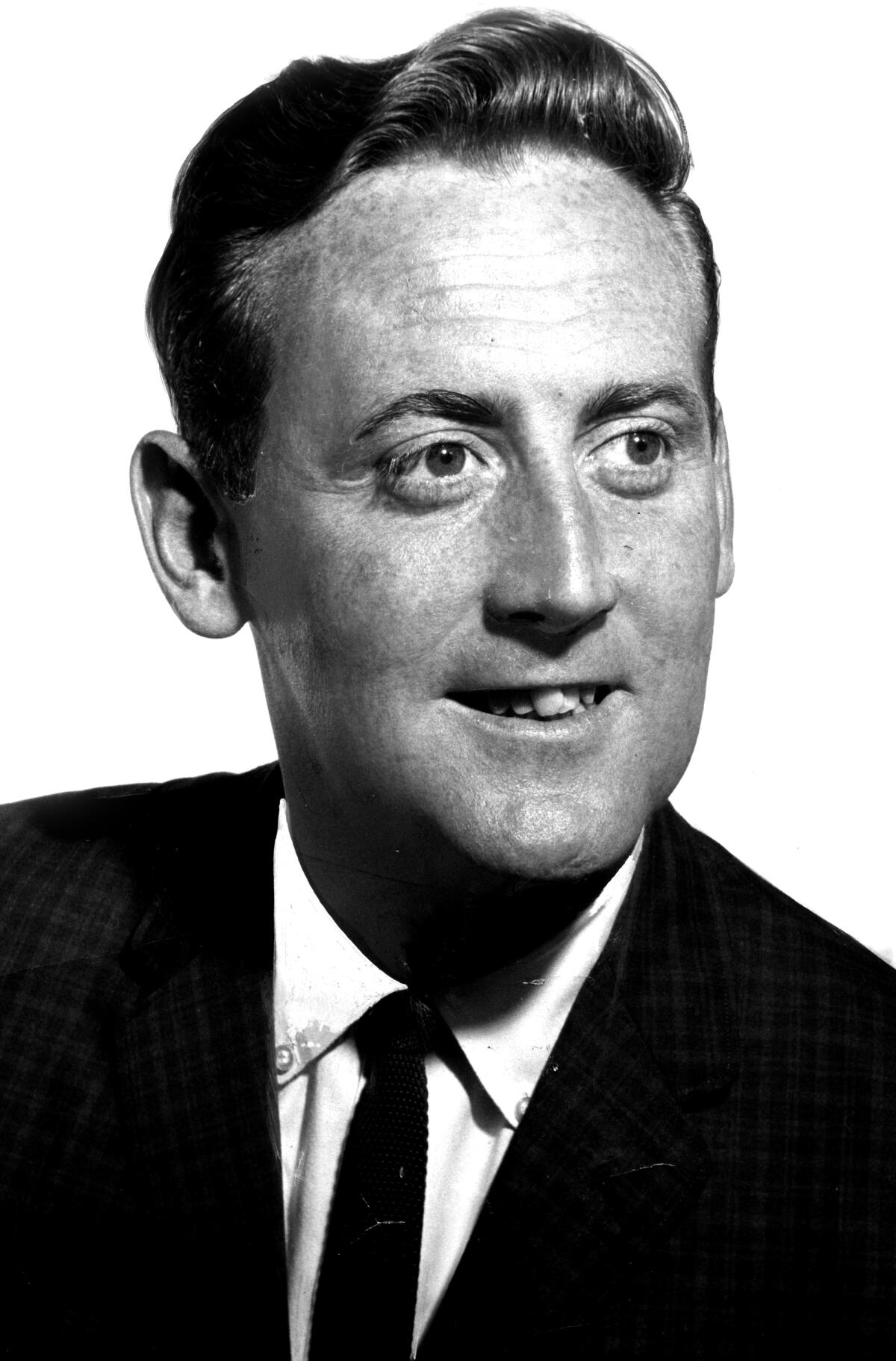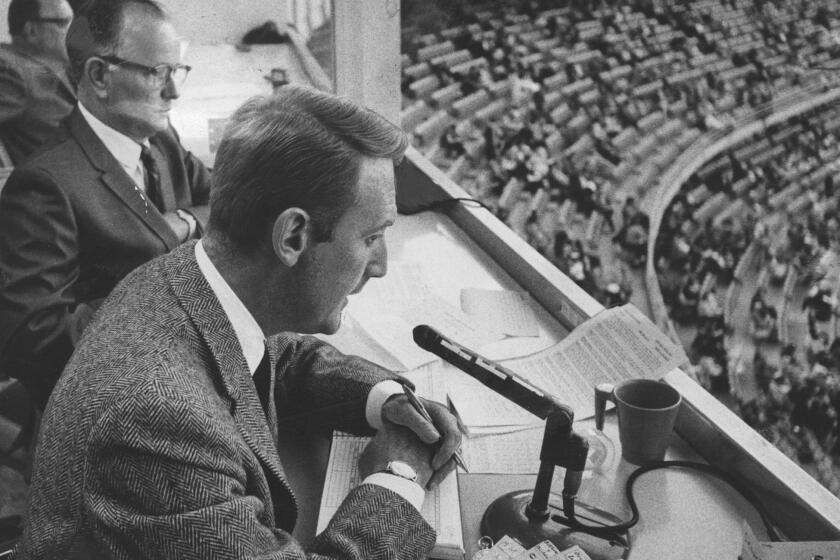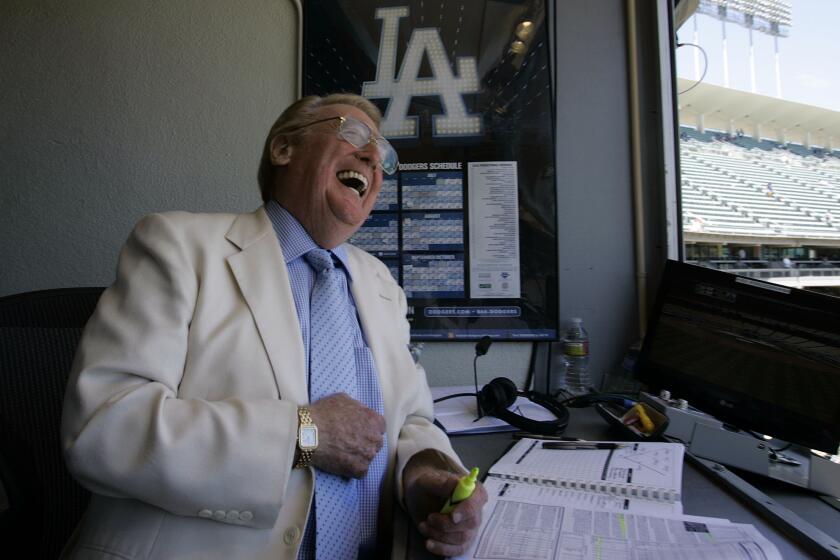My mother’s love affair with Vin Scully

- Share via
On the night Vin Scully died, most of us who are lifelong Dodger fans found out immediately and together — the graphic of his familiar face and 1927-2022 flashed across the screen of the game in progress, Dodgers versus Giants. My mother was watching, missing his voice as she has done every game day since he retired in 2016.
We have talked about Scully often over the three years her memory loss has deepened. Her purse, at her feet, disappears every few minutes but Sandy Koufax’s perfect game replays like it just happened.
My Swiss German mother learned her best English listening to a transistor radio as Vin Scully’s tenor voice called Dodger games. Now she is 87, and when we drink tea and eat Toblerone with the game on, she reminds me that Scully changed her life. When she had no car and no money, his voice carried her into a new and better future.
My mother was born Gabrielle Leu in 1934 in a tiny village in the Swiss Alps. Her mother died when she was 9, leaving my mother and two younger brothers to the care of a stern nurse from a nearby valley. That nurse married their father and then had her own child. In 1950, escaping the lack of work after World War II, the family took a boat to Canada, where my mother’s stepmother found them work on a farm. She tried to marry my mother to a local pig farmer; at 15, my mother ran away to the city of Oshawa.
Eventually, her family left Canada for California, and at 19, my mother rejoined them, in Fontana. But she lasted only days before leaving again, to live on her own in a boarding house in Riverside.
In the summer of ‘61, Vin Scully talked about the weather, about the gathering twilight, about the history of the baseball, about nothing really that important. But sometimes talking about nothing really that important speaks something into being.
It was 1954. She got a job at Household Finance. She bought herself a transistor radio, the just-released Regency TR-1, the world’s first pocket transistor radio. And she discovered that Scully’s voice could keep her from being frightened.
“I had to walk to work; I had no car,” she told me the day after Scully died, when the Dodgers played the Giants again. “You had to be careful, a woman walking, a car would try to pick you up. So I carried my radio and on the way home, I listened to Vin Scully. He was doing the Dodgers in New York then.”
My mother was tiny — 4-feet-11, 98 pounds. At work, men tried to get her alone. At the boarding house, it was one woman among five men, no locks on the bedroom doors, and while she was out, people stole her things: “I was afraid in my room, but I had my radio.”
And Scully.
She wanted to lose her accent: “ ‘Where are you from, little lady?’ the men would say to me all the time. No one wanted to hear the way I sounded after the war. I actually learned my English from Vin. He was such a charming speaker, with smooth delivery, and he interjected other events, and history, comments about L.A. and Orange County. He left me kind of spellbound.”
This story must have been told countless times in Southern California, by people who moved here from Mexico, the Philippines, Japan, Germany.
My mother was in love with Scully, but in 1955, Richard Straight went to Household Finance for a $50 loan. He was on strike at Boeing Aircraft, sleeping in his car and had left his first wife and two children. My mother got the loan for him. They married in November, and in June 1961, when I was 9 months old, they left me with a babysitter and finally went to Memorial Coliseum to see a live game — the Dodgers lost to the Giants 4-2. Even there, people listened to Scully on their transistor radios.
His voice was everywhere in my childhood. Most men I knew carried transistor radios in their shirt pockets while they fixed cars, picked oranges, turned over hot dogs on a grill. We heard Scully call the 1963 and 1965 World Series. After my father left us, my mother married another man who loved baseball, and when they could, they took us to Dodger Stadium. Five kids in a 1966 Ford station wagon, an hour’s drive each way, sometimes we heard Vin from the dashboard. I parceled out a single box of Crackerjack five ways in the back seat, and listened.
Legendary Dodgers announcer Vin Scully died Tuesday at age 94. Here’s some of what our staff has written about him now and throughout his celebrated life.
The summer I was 19, I worked as a sports stringer for the Riverside Press-Enterprise. I always added color to my writing, like the frost on the grass of a football field, or the way a blind swimmer told me she felt for the pool’s edge. I learned that from listening to Scully.
One night, when the Dodgers beat reporter had a conflict, I was sent to cover the game. When another reporter escorted me to meet Scully, Vin shook my hand.
I said what I’d been practicing — that my mother had learned perfect English from him, that she always wished she could marry him. He threw back his head and laughed, full-throated, and said that he was on his second marriage and very happy; I said my mother was on her second marriage too, but she’d give that up in a heartbeat. “In a heartbeat,” that’s what she’d asked me to say — such an American phrase. He laughed again and shook my hand in goodbye.
My mother watches the Dodgers at my house now. She marvels at players born in Venezuela, Mexico, the Dominican Republic. Austin Barnes, the Dodger catcher, grew up in Riverside and went to high school with my daughters. My mother loves that story.
She loves seeing my neighbor, Mario, whose parents were born in Morelia, Michoacán, Mexico, and his wife and their five kids in full Dodger gear — jerseys and hats — and through their window, the Virgin of Guadalupe neon sign that lights up the wall next to their big-screen TV, game on.
But she also misses using her imagination to “see” the fans, the players, the action. She misses the transistor radio and the intimacy of Scully’s voice.
On the day of his final home game, in 2016, Scully asked: “Were you among the crowd that groaned at one of my puns? Or did you kindly laugh at one of my little jokes? Did I put you to sleep with the transistor radio tucked under your pillow?” My mother sobbed.
For her, and millions of others, his demeanor, his stories and the language he used were aspirational and generous. My mother told me, “He made you feel like you knew that baseball player, and he made every single player important. He made you see the sky, and he taught you all the right terms for America: high fly ball, grand slam and stealing home.”
Susan Straight’s new novel is “Mecca.” Her memoir is “In the Country of Women.”
More to Read
A cure for the common opinion
Get thought-provoking perspectives with our weekly newsletter.
You may occasionally receive promotional content from the Los Angeles Times.











